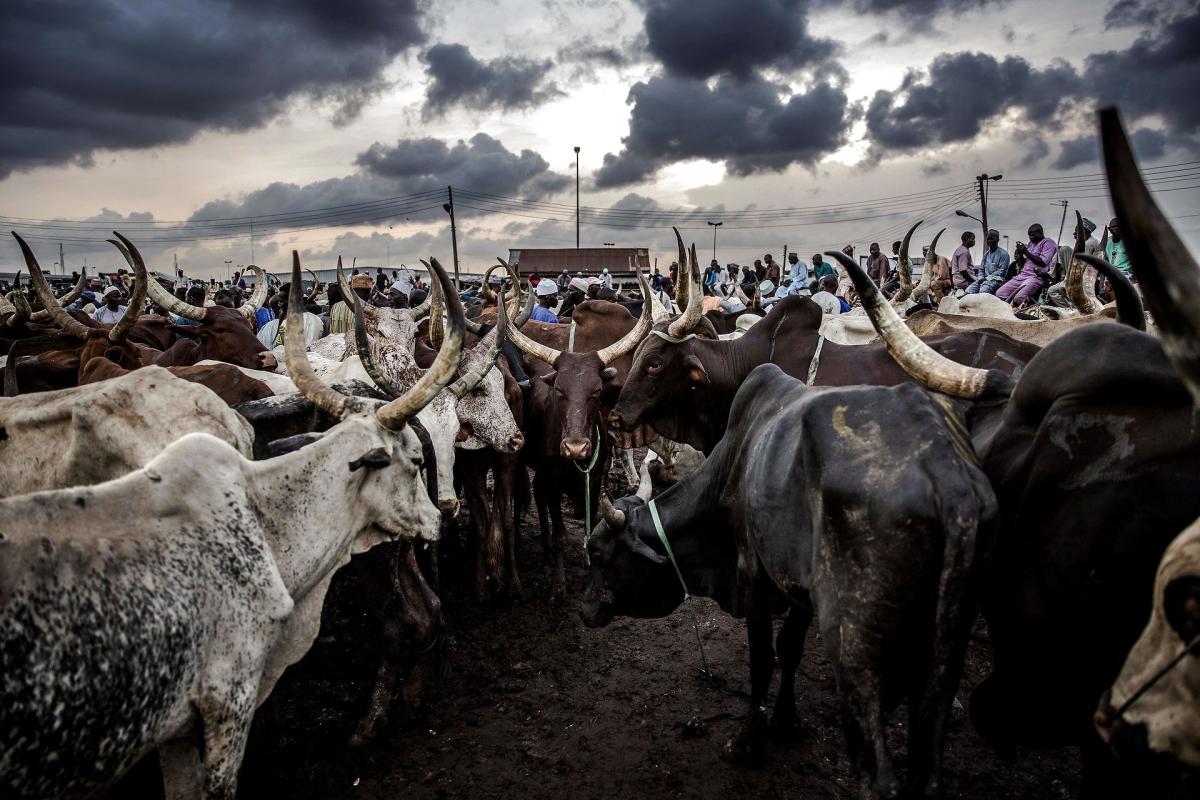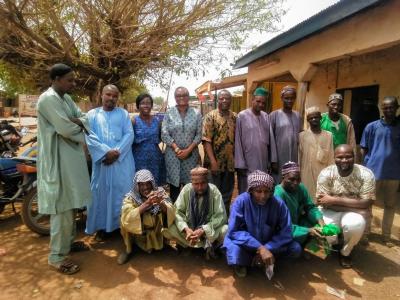
The media is a powerful instrument in Ghanaian land-use conflicts
In northern Ghana, a serious resource conflict is taking place between local farmers and herdsmen of the Fulani tribe. In this blog post Professor Dzodzi Tsikata, Director of the Institute of African Studies, University of Ghana, writes about the role that national and social media play in a conflict that often results in violent clashes.
On the road to Kintampo in the Ahafo Region of Ghana, where we spent the night before heading out to the Afram Plains to identify research sites for a study on the policing of herdsmen-farmer conflicts, I received an interesting phone call. It was from someone who identified himself as Imam Sonde, the Chair of the Cattle Owners Association of Ghana. He wanted to know why I had been in Gushiegu the day before speaking to members of the Fulani community about their issues. I explained that it was for research and that we were from the University of Ghana. He indicated that he wanted to meet when we returned to Accra to learn more. A few minutes later, he sent me a copy of a group photo we had taken after our meeting in Gushiegu and asked me to identify myself. I cannot recall who had requested this photo, us, or the group. The important thing now was that both parties had a copy of the photo. For Imam Sonde, the photo enabled him to put a face to my name and verify our claim to be researchers. I complied with his request, and he then sent me a photo with two persons and identified himself in it.
This short but eventful conversation, conducted with smartphones and WhatsApp, confirmed what had already become apparent in the national space. The Fulani community in Ghana is organising itself in new ways to respond to the dominant national discourse that has cast itinerant herdsmen, and by extension the Fulani community, as lawless foreigners. They are seen as prone to drive their cattle through food crop farms to feed, and disturb the peace in Ghana through violence, unreasonable behaviour, rapes and armed robbery.
The media has routinely used the term ‘Fulani menace’ to describe the problem and has in this way failed to highlight the class/resource dimension of the conflict, preferring to stress the ethnicity and foreign status of the herdsmen
Sedentary farmers-migrant herdsmen tensions are a serious resource conflict in Africa. In Ghana, as in the rest of West Africa, it mainly involves Fulani pastoralists and sedentary farmers across the country. Hotspots include the Agogo area in Asante Region, the Kwahu area, and Afram Plains in Eastern Regions and the Bimbilla and Gushiegu areas in Northern Region. Experts have argued that the situation in Agogo and the Afram plains with long periods of conflict are exceptions rather than the rule. However, it is becoming clear that endemic conflicts are likely to become more widespread with increasing land scarcity and the loss of grazing areas as a result of the expansion of dry areas southwards and more widespread agricultural commercialisation. The Ghanaian state has responded to the periodic flare-up of conflict by bringing in the military to join the police in operations known as Operation Cowleg, which has seen several iterations since 2012. The main aim of these operations has been to drive away the so-called ‘alien herdsmen’.
The ‘Fulani menace’
The Ghanaian state has over the years deployed particular discourses to make this land use conflict a law-and-order and national security concern, often in response to demands of the chiefs and intellectuals of farming communities. Operation Cowleg has also been justified on grounds of economic development, and the media has tended to report predominantly from the point of view of the military and police, documenting expulsions, arrests, the shooting of cows and exchanges of fire with herdsmen. The media has routinely used the term ‘Fulani menace’ to describe the problem and has in this way failed to highlight the class/resource dimension of the conflict, preferring to stress the ethnicity and foreign status of the herdsmen. In 2018, a group calling itself the Kwahu Professional Network issued a veiled criticism of Kwahu citizens who in their view did not seem to realise that this conflict was one affecting all Kwahu people wherever they might be, irrespective of their occupation.
The media carried reports of spokespersons for the Fulani community defending them from stereotyping and criminalisation
The periodic nature of Operation Cowleg points to the fact that the Fulani herdsmen continue to return after each expulsion. The efforts to expel them have grown more and more deadly, involving casualties on both sides. This also suggests that the herdsmen have started to deploy more sophisticated weapons.
During Operation Cowleg in 2018, a new dynamic emerged. The media carried reports of spokespersons for the Fulani community defending them from stereotyping and criminalisation. They made the case that they belonged in Ghana as they have resided in the country long-term, and drew attention to the ECOWAS protocols on pastoralism that were being breached by the Ghanaian state’s draconian approaches to the issue (ECOWAS is the Economic Community of West African States, a sub-regional organisation). A Fulani Association, with a Professor Sheikh Osman Bari as the spokesperson, drew attention to the existence and organised presence of settled Fulani communities, who constitute the majority of the Fulani in Ghana. It has emerged that there are several Fulani associations that are now organized at the district, regional and national levels.
Spokespersons report that they are frustrated by the conflicts and the inability of chiefs and landowners to regulate land-use in their communities. They have also expressed unhappiness about ‘the biased media’ that does not report their struggles and want to make their voices heard. Sedentary Fulani communities, some of whose members are also involved in rearing and trading cattle, prefer peaceful approaches to conflicts with farmers. This is likely to create some ambivalence in their relations with the nomadic Fulani and seasonal Fulani migrants, who, according to scholars such as Steve Tonah, are more likely to employ force in asserting claims to their use of grazing land.
The Fulani side of the story
One result of the efforts of the spokespersons is an emerging counter narrative about the Fulani. Some of the messages include the insistence that the Fulani are Ghanaian, and that ethnicity is not a criterion for nationality. Secondly, they have been pointing out that not all Fulani are herdsmen, and media reports have identified the wife of the vice president of Ghana, Samira Bawumia, and the head of gynaecology at the Korle-bu Teaching Hospital, Ghana’s most important health facility, as members of the Fulani community. A third message is that not all Fulani are involved in crime, and criminals must be dealt with without tagging an entire ethnicity as criminal. At the height of Operation Cowleg in 2018, the Fulani community paid a high-profile visit to the President of Ghana, Nana Akufo-Addo, and a presidential candidate in neighbouring Sierra Leone complained about the bad treatment of the Fulani to an ex-president of Ghana.
WhatsApp is playing an important role in the media strategies of Fulani communities. It is being used to share intelligence, strategize, and assess risks and opportunities in the struggle to change the national discourse about herdsmen
It has become clear that the Fulani communities are prosecuting their struggles on several fronts. While the nomadic herdsmen and migrant Fulani respond to force with force, the sedentary as well as nomadic Fulani respond to the media war with media appearances and policy advocacy. The media clearly took notice and began to publish the Fulani side of the story. Reports in the media in January 2018 referred to appeals to governments, security agencies, chiefs and communities and denials of the crimes reported against them.
In one case, the media reported that nomadic Fulani in the Asante Akyem District had justified their decision to shoot some members of a military patrol team in the area. According to the nomads, instead of enforcing laws in the area, the military were rather collaborating with local residents to secretly kill their cattle and sell the meat to local ‘chop bar’ operators. That same report noted that a Fulani man who identified himself as Fullo said the media had not been fair in its reporting on the Fulani across the country. Another report said the Fulani community in Ghana wanted compensation for over 1500 killed cattle. A retired diplomat and the President of the Fulani association of Ghana, Professor Sheikh Osman Bari, organized a press conference to address the fallout from Operation Cowleg. It was noted that losses to the Fulani community following the operation was 6 million Ghana cedis, more than 1 million US dollars, and there was a need for the government to pay compensation for these losses.
In spite of the new visibility of the Fulani community, their multi-level strategies, which include the use of violence, has inherent dangers, given that the Ghanaian state is the only entity with the legal means of violence. At the same time, it reveals the ineffectiveness of the state’s law and order approach to the question of how to reconcile struggles between farmers and herders.
My encounter with Imam Sonde suggests that in spite of the high poverty levels that would have limited the spread and use of smartphones and social media platforms in Northern Ghana, WhatsApp is playing an important role in the media strategies of Fulani communities. It is being used to share intelligence, strategize, and assess risks and opportunities in the struggle to change the national discourse about herdsmen. The Fulani in Ghana are not alone in recognizing the value of this medium. In Bimbilla, the site of a longstanding conflict between the Nanumba and Konkomba, key informants mentioned that social media was an important way of keeping members of the conflict communities who lived in Accra and beyond abreast with developments. In some cases, social media reports ignited episodes of tension and brought new protagonists into the conflict. Beyond Ghana, social media has been an important galvanizing tool in struggles from the Arab Spring to recent events in Sudan and to the current convulsions across the globe as a result of the brutal murder of George Floyd in the US.
Dzodzi Tsikata is Research Professor and Director of the Institute of African Studies at the University of Ghana. In a career spanning over 27 years, Tsikata’s research has been in the areas of gender and development policies and practices; women’s movements and gender equality activism; the politics and livelihood effects of land tenure reforms, large scale land acquisitions and agricultural commercialisation; and informal labour relations and conditions of work, and she has led research projects on these subjects over the years.
Read more about the project: D-SIP – Domestic Security Implications of UN Peacekeeping in Ghana

